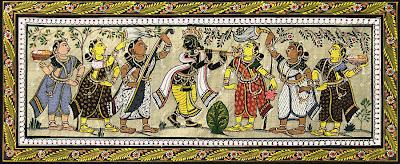VMA 1.49 :: Even while in Vrindavan, you wander about in externals!

Durvasa Muni's ashram, about two kilometers across from Vishram Ghat in Mathura. (P.C. Pure Bhakti ) Oh mind! My brother! Here you have come with a little hope to this raremost Vrindavan forest, which is such a supreme essence of the ocean of Krishna’s blissful rasa, such a form of variations of the ujjvala-rasa that even those who have gone through all the topmost Upanishads have not had even the slightest glimpse of it, and yet you constantly wander around in externals, driven by the witch of petty aspirations. (1.49) kṛṣṇānanda-rasāmbudheḥ parataraṁ sāraṁ vicitrojjvalā- kāraṁ pāra-gatair api śruti-śiro-vṛndasya nekṣyaṁ manāk | śrī-vṛndā-vipinaṁ sudurlabhataraṁ pratyāśam āsādya bhoḥ kṣudrāśā-kupiśācikā-vaśa-gato bambhramyase kiṁ bahiḥ || Commentary Prabodhananda has already mentioned the Upanishads in 1.12 and 1.22 . Here he speaks of the śruti-śiraḥ , which is a reference to Gopāla-tāpanī , as indicated in Gautamīya-tantra . The ujjvala-rasa is t...




